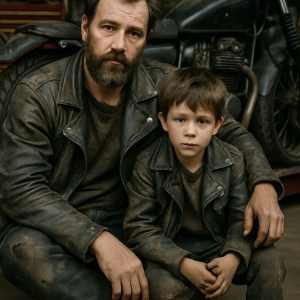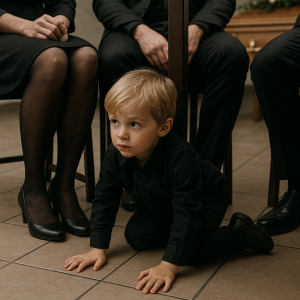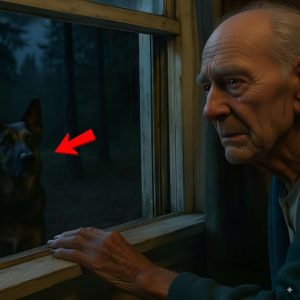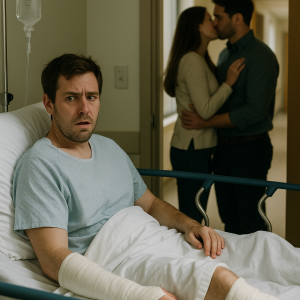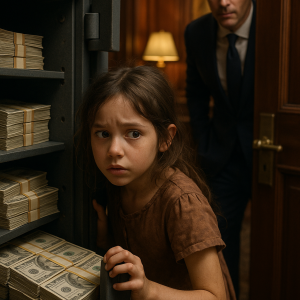My Parents Skipped My Baby’s Funeral to Go to My Brother’s Pool Party. Even writing those words feels like a cruel joke, something you’d expect from a bad novel rather than my real life. But that is my truth. While I stood at the graveside, clutching my husband’s hand as we lowered our six-month-old daughter into the ground, my parents were clinking champagne glasses and laughing in the sun. Their reasoning? “It’s just a baby. Your brother’s party matters more.”
That day, something broke inside me. It wasn’t just grief — it was clarity. A clarity forged from years of being the forgotten child, of watching my brother crowned as the golden boy while I was treated as an afterthought. Losing my daughter, and then being abandoned by my own parents in that moment, forced me to make a decision that changed my life forever.
Growing Up as the “Lesser Child”
My name is Hannah Mitchell, and for as long as I can remember, my parents — Eleanor and Charles — made it clear where I stood in the family hierarchy. My older brother, Daniel, was the shining star. If he joined the soccer team, it warranted a backyard celebration with neighbors and a barbecue feast. When I earned a spot in the honors program that same year, the response was, “That’s nice, Hannah,” before they pivoted back to discussing Daniel’s upcoming game.
This wasn’t a one-time oversight — it was a pattern. My milestones were brushed aside with obligatory nods, while Daniel’s were paraded around like trophies. By high school, I had stopped competing for their attention. I poured my energy into academics, friendships, and carving out a life that was mine alone.
It was in college that I met Ethan, the man who would later become my husband. Ethan came from a family so different from mine it felt like stepping into a new world. His parents remembered birthdays, showed up for every event, and genuinely cared about his dreams. At first, I thought it was an act — too good to be true. But I eventually realized: this was normal love. This was what family was supposed to feel like.
Ethan and I married three years ago. We bought a modest house about 40 minutes away from my parents — close enough to be polite, but far enough to protect myself. When we announced our pregnancy, Ethan’s parents cried tears of joy and immediately began planning a baby shower. My parents? My mother’s reaction was a dismissive, “That’s nice. Did you hear Daniel might be promoted?”
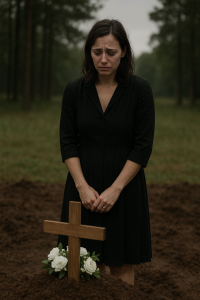
The Arrival of Baby Grace
Our daughter, Grace, was born on a frigid January morning. The moment I held her in my arms, a tidal wave of love consumed me. Ethan’s parents rushed to the hospital with flowers and gifts, their faces glowing with pride. My parents showed up the next day, stayed less than an hour, and left early because my mother “didn’t want to miss her hair appointment.”
Over the next six months, Ethan’s parents visited every week. They rocked Grace to sleep, took pictures, and celebrated every milestone. My parents came twice. Both times, they held Grace awkwardly, like she was a fragile vase they couldn’t wait to set down.
Still, I sent weekly photo updates. Grace’s first smile. Her first laugh. Rolling over for the first time. My mother’s responses were usually just a thumbs-up emoji. My father didn’t reply at all.
Then Daniel announced his engagement. Suddenly, my parents were alive with excitement, planning an extravagant engagement party scheduled for the same weekend as Grace’s church dedication. When I reminded my mother of the conflict, she waved me off. “We’ll have to miss the baby thing, Hannah. Daniel’s engagement is a once-in-a-lifetime event.”
I wanted to scream: “So is my daughter’s dedication.” But instead, I swallowed the words, just as I always had.
The Night Everything Fell Apart
A week before tragedy struck, Grace developed a mild cold. Her pediatrician assured us it was nothing serious. By the weekend, she seemed back to her bubbly self.
That Tuesday night, Ethan and I tucked her into her crib, kissed her forehead, and whispered goodnight. The baby monitor was quiet all night — too quiet. When I went to check on her at dawn, my world shattered.
“Grace,” I whispered, touching her cheek. It was ice cold.
The next hours are a blur: my screams, Ethan frantically performing CPR on her tiny body, the flashing lights of paramedics, the sterile hospital room where a doctor with sorrowful eyes told us, “I’m so sorry. It appears to be Sudden Infant Death Syndrome.”
Nothing prepares you for that sentence.
In the haze of shock, I called my parents. “Mom… Grace… she died last night.”
There was a pause. Then a flat, “Oh, Hannah, that’s terrible.”
No tears. No urgency. No offer to come. Just words stripped of humanity.
Planning a Funeral Alone
Michael’s — sorry — Ethan’s parents were at our door within hours, holding us up when we couldn’t stand. My parents? They waited two days to call and asked, “When’s the funeral?”
“Friday, at 11,” I said.
“Friday?” my mother repeated. “That’s the day of Daniel’s pool party. We can’t cancel on him.”
I thought I’d misheard. “Mom… this is Grace’s funeral. Your granddaughter’s funeral.”
“I know, Hannah. But think rationally. She was just a baby. You can always have another one. But Daniel’s engagement — that’s important for his future.”
Those words were like knives. It’s just a baby. Daniel’s party matters more.
The Funeral Without Them
The morning of the funeral was bright and cruelly beautiful. I checked my phone on the way, praying for a message saying they’d changed their minds. Instead, I found a text from Daniel:
Sorry about the baby. Hope the funeral goes okay. Can’t wait to celebrate later!
At the cemetery, Grace’s casket looked impossibly small, adorned with pink roses. Friends, neighbors, Ethan’s family — all stood with us. My parents’ absence was deafening.
During the eulogy, my phone buzzed again. Against my better judgment, I glanced at it. Daniel had posted photos from the pool party. My parents were in the background, smiling, champagne glasses raised, while my daughter was being lowered into the ground.
That moment seared itself into my soul.
The Breaking Point
A week later, my mother called. “How are you?” she asked, as if we hadn’t just buried my child.
“I buried my daughter without her grandparents there,” I said flatly.
“Well, no need for that tone,” she replied. “Why don’t you come to Sunday dinner? Daniel and Claire will be there. They’ll tell you about their wedding plans. It might take your mind off things.”
Take my mind off things. As if Grace’s death were a bad mood to be distracted from.
Against my instincts, Ethan and I went to dinner two weeks later. Nobody mentioned Grace. The conversation revolved around Daniel’s promotion and Claire’s wedding dress.
Finally, I snapped. “Did Grace’s funeral interfere with your party?”
“Hannah, don’t bring up unpleasant topics,” my mother scolded.
“Unpleasant? My daughter’s death?”
“What’s done is done,” my father said.
Daniel rolled his eyes. “This is why we didn’t want to talk about it. You’re so dramatic.”
I felt rage burn hotter than grief. They hadn’t just skipped the funeral. They had erased Grace from existence.
Finding My Voice
Over the following weeks, I began therapy with a grief counselor, Dr. Lawson. She gave me words I had never had before: golden child, scapegoat, generational dysfunction.
It wasn’t just about the funeral. It was about a lifetime of being invisible. Grace’s death was the final betrayal.
I decided I couldn’t stay silent anymore.
First, I declined Daniel’s official engagement party. “Still grieving Grace,” I texted. When my mother called to pressure me, I replied, “Family needed to stick together at Grace’s funeral.”
Then I told the extended family the truth: my parents hadn’t missed the funeral due to health issues, as they claimed. They had been at Daniel’s pool party.
The lies unraveled quickly.
The Confrontation
Two months later, I asked to meet with my parents privately. They agreed, thinking I wanted reconciliation.
I placed a framed photo of Grace on their coffee table. “This is your granddaughter. The one whose funeral you skipped. The baby you dismissed as ‘just a baby.’”
They fumbled for excuses. I laid out evidence: text messages, screenshots of their Instagram photos during the funeral, a timeline of their favoritism spanning my whole life.
“You can’t change the past,” my father said stiffly.
“No,” I replied. “But you can own it. You can admit what you did.”
When they offered a hollow, “We’re sorry you were hurt,” I shook my head. “That’s not an apology. That’s blaming me for feeling pain.”
Finally, I read a letter I had written. In it, I explained how their choices had invalidated Grace’s existence and destroyed any illusion of family left between us. For my healing, I needed distance.
“This is goodbye,” I finished.
The Aftermath
Driving home, I expected anger. Instead, I felt peace.
Over time, cracks appeared in their armor. A handwritten letter from my father arrived months later, admitting, “We were wrong. Unforgivably wrong. I don’t expect forgiveness, but I am sorry.”
My mother sent an ornament with Grace’s name and angel wings. Daniel came by with a rose bush for her memorial garden.
Small steps. Not redemption, but acknowledgment.
I also found purpose by joining a support group for parents who lost infants. Sharing Grace’s story helped others, and in helping them, I began to heal myself.
On the one-year anniversary, we held a small ceremony in Grace’s garden. Balloons floated into the sky, carrying messages of love. Ethan’s parents stood by us, as steady as ever. Even my own parents came, standing silently at the edge, finally facing the weight of what they had done.
Conclusion
My Parents Skipped My Baby’s Funeral to Go to My Brother’s Pool Party. That single act ripped away the last veil of denial I had about where I stood in their hearts.
But it also gave me strength. Strength to protect Grace’s memory. Strength to speak the truth. Strength to walk away from a cycle of favoritism and neglect.
I lost my daughter, but in the ashes of that loss, I found my voice. And this time, I will never let anyone silence it again.
